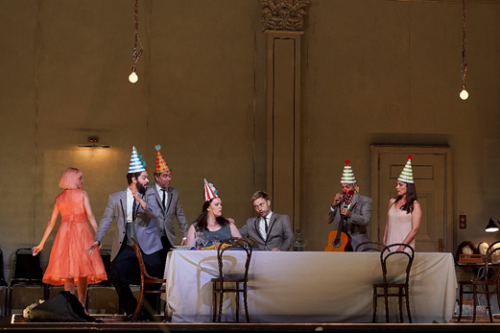 Spain Richard Strauss, Ariadne auf Naxos: Soloists, Chorus and Orchestra of the Gran Teatre del Liceu / Josep Pons (conductor). Gran Teatre del Liceu, Barcelona, 27 & 28.9.2021. (JMI)
Spain Richard Strauss, Ariadne auf Naxos: Soloists, Chorus and Orchestra of the Gran Teatre del Liceu / Josep Pons (conductor). Gran Teatre del Liceu, Barcelona, 27 & 28.9.2021. (JMI)

Production:
Director – Katie Mitchell
Sets – Chloe Lamford
Costumes – Sarah Blenkinsop
Lighting – James Farncombe
Casts:
Ariadne – Miina-Liisa Värelä/Johanni Van Oostrum
Bacchus – Nikolai Schukoff/David Pomeroy
Zerbinetta – Elena Sancho-Pereg/Sara Blanch
Composer – Samantha Hankey/Paula Murrihy
Music Master – José Antonio López
Dance Master – Roger Padullés
Harlequin – Benjamin Appl
Naiad – Sonia de Munck
Dryad – Anaïs Masllorens
Echo – Nuria Vilà
Scaramuccio – Vincenç Esteve
Truffaldino – Alex Rosen
Brighella – Juan Noval-Moro
Barcelona’s Liceu opened the new opera season with this Richard Strauss opera, which was last seen here in 2002. At that time, the main characters were played by Adrienne Pieczonka and Edita Gruberová, and there is no question that both triumphed.
On this occasion the vocal pomp was not at the same level, and the cancelations that took place for the roles of Ariadne and Bacchus had an effect. A few days ago, I commented in a review of La Cenerentola (review click here) that Teatro Real did not seem to have given too much emphasis to glitz at the opening of the season: the castings did not offer big names, and it was not a new production. The same can be said of the Liceu in this Ariadne auf Naxos.
The staging is by English director Katie Mitchell, and it premiered at the Aix-en-Provence Festival in July 2018. It was subsequently mounted in Paris and Helsinki, but the scheduled performances in both Luxembourg and Copenhagen had to be canceled. These opera houses and the Liceu are coproducers.
The opera is set in the house of the richest man in Vienna, although the house does not appear to be that luxurious. A curtain down the middle divides the stage in two. On the right is a table where Ariadne sits and the other characters roam about; on the left are rows of chairs. Costume changes take place on the stage itself.
Katie Mitchell has made her personal touches to the plot, and here the Ariadne abandoned by Theseus is pregnant. She gives birth to a child in the final part of the opera, helped by Naiad, Dryad and Echo. The idea of keeping the composer on stage and conducting from the side adds nothing, and it has to be a torment for the performer. I am not convinced by this production, although I can’t say that it’s bothersome.
Josep Pons led the work well and helped the singers. He drew a fine performance from the Liceu Orchestra, one that seemed better to me than on previous occasions.
Iréne Theorin had been announced to sing the part of Ariadne, but a few weeks ago she canceled and was replaced by soprano Miina-Liisa Värelä, whom I had not seen before. She has an attractive and ample middle voice, nicely suited to the character, and made a positive impression. The two extremes of the tessitura were not as strong: the low notes were somewhat short and her voice was tight at the top. In the second cast Ariadne was played by Johanni Van Oostrum, whom I was also hearing for the first time. She has a wide and appealing voice throughout the range, and sang with gusto and emotion.
Bacchus was played by tenor Nikolai Schukoff, who has appeared several times at the Liceu. His voice is suitable for the character but, as always, he had problems in the upper reaches. His singing can be forceful, and his voice tends to lag behind, especially at the end of the performance. In the second cast, David Pomeroy replaced the previously announced Brandon Jovanovich. He did well, although I find him more lyrical than what the character requires. He was a bit tight in his upper notes.
Soprano Elena Sancho-Pereg as Zerbinetta gave a strong performance, with a voice that is well suited to the character. She solved the difficulties that her great scene presents. Sara Blanch in the second cast had a real triumph. I hadn’t had the chance to see her until now and was greatly impressed. She solved her big scene with confidence and ease, overcoming the enormous difficulties of the score. I had heard good things about her, and she confirmed them.
Mezzo-soprano Samantha Hankey in the part of the Composer sings with good taste, revealing a well-handled voice that had no problems reaching the audience. In the second cast the Composer was performed by Paula Murrihy, who also did well.
José Antonio López as the Music Master and Roger Padullés as the Dance Master were good in their roles, as was the Zerbinetta troupe: Benjamin Appl (Harlequin), Vincenç Esteve (Scaramuccio), Alex Rosen (Truffaldino) and Juan Noval-Moro (Brighella). The three Nymphs – Sonia de Munck, Anaïs Masllorens and Nuria Vilà – were also fine in their parts.
José M. Irurzun
